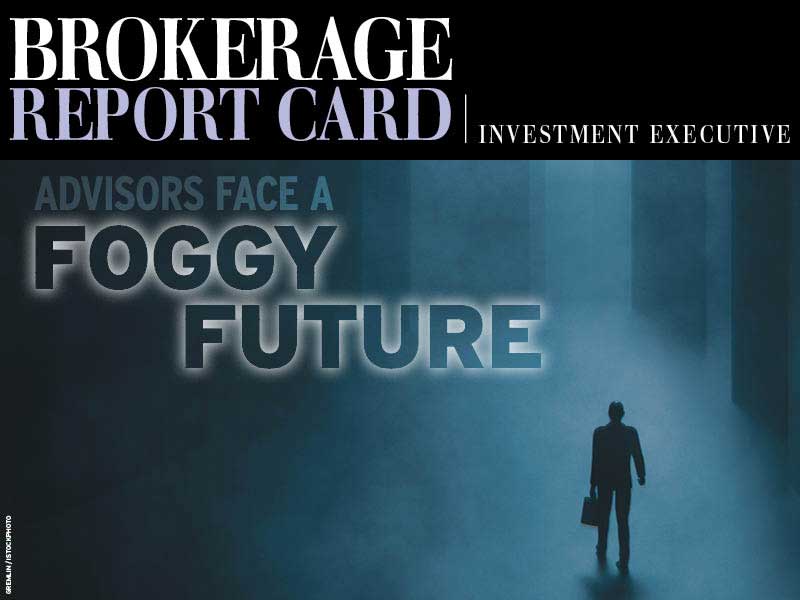
Year after year, investment advisors surveyed for Investment Executive‘s (IE) Brokerage Report Card rate their firm’s “back office and administrative support” as one of the categories that matter most to their businesses – and the results this year proved no different. However, with this level of importance comes expectations that firms struggle to meet.
For the past six years, this category has had either the largest or second-largest “satisfaction gap,” which occurs when the average importance rating is higher than the average performance rating. That trend persisted this year: the category had the second-largest gap in the survey, with an overall average performance rating of 7.6 and an overall average importance rating of 9.1.
A closer look at the numbers reveals advisors have new grievances regarding their back offices. Specifically, five firms in the survey were rated lower by half a point or more in the category, while only one firm was rated higher by that margin.
The reasons for this trend vary, but advisors with ScotiaMcLeod Inc. and TD Wealth Private Investment Advice (TD Wealth PIA), both based in Toronto, gave their firms significantly lower ratings in the category – the two lowest, in fact – because advisors believe that cutbacks to the back office have resulted in more duties being off-loaded to advisors and their teams.
ScotiaMcLeod advisors gave their firm a survey-low rating of 5.9 in the category, down from 6.4 last year. These advisors said believing their back office provides the necessary level of support is difficult when advisors are taking on more work because of cutbacks.
“The firm has been downsizing the back office aggressively,” says a ScotiaMcLeod advisor in Alberta. “Getting a hold of someone is very difficult.”
Rob Djurfeldt, managing director and head of ScotiaMcLeod, says advisors’ dissatisfaction is a result of the hiccups being experienced in the transition to a more technology-based back office that’s being made in response to an ever-increasing regulatory workload.
“We see the solution being different than hiring more people,” Djurfeldt says. “[Our plan is to] invest in technology to make the client experience and advisory team experience better, so [there is] less of this back-and-forth paperwork issue with the back office that’s been around.”
TD Wealth PIA advisors also believe they’ve been left to deal with back-office problems on their own; thus, they gave their back office a rating of 6.0, down from 6.7 in 2017.
“[The firm] is constantly reducing the back-office support and this is putting strain on my assistant and me,” says a TD Wealth PIA advisor in Ontario.
TD Wealth PIA noted in an email to IE that there were no cutbacks to the back office. Rather, advisors’ businesses have been growing more quickly during the past few years, which has strained the firm’s systems.
Meanwhile, advisors with Vancouver-based Canaccord Genuity Wealth Management (Canada) and Toronto-based Raymond James Ltd. rated their firms lower in the category because their back offices have suffered from the firms’ focus on aggressive growth strategies to the detriment of advisory teams and clients alike.
In the case of Raymond James, which received a rating of 7.9 in the category, down from 8.7 year-over-year, its advisors said they still feel the after-effects of the firm’s acquisition of Montreal-based MacDougall MacDougall & MacTier Inc. (3Macs) in 2016.
“The back office has been troublesome in the past year,” says a Raymond James advisor in Alberta. “We merged with 3Macs and [the back office] has experienced a lot of trouble that’s impacted us advisors.”
Richard Rousseau, executive vice president, wealth management, at Raymond James, notes that the firm has gone through growing pains as a result of “a growth spurt” of more than 40% in the number of advisors at the firm. Thus, he’s optimistic that things will soon return to normal as the firm begins accommodating both an increase in advisors recruited to Raymond James and the firm’s acquisition of 3Macs.
“Everyone has worked hard,” he says, “and I think things are under control with the repapering from the 3Macs transition.”
Advisors with Canaccord, who rated their back office at 6.7, down from 7.7 last year, also pointed to growing pains as the reason for their dissatisfaction.
“Canaccord has brought in a lot of advisors [recently], and I think [the back office] is just a little swamped right now,” says a Canaccord advisor in Ontario.
Canaccord is working hard to keep the goals of the back office and advisors aligned through this growth spurt so that business can flow as smoothly as possible, says Terry Bourne, the firm’s senior vice president and head of operations: “We’re focusing very heavily on ensuring that we continue to identify areas in which we can improve the workflow, look for productivity improvements, leverage automation and technology, and help improve the overall service.”